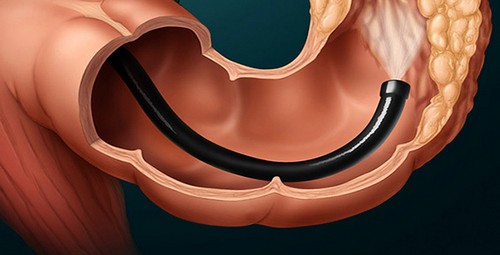The deciding factor in the issue of anesthesia may be the cost of the planned examination. If general anesthesia or sedation is expected, then you will additionally have to pay for the time spent in the hospital while the patient “moves away” from the action of anesthesia, the work of the anesthetist, the drug itself.
Some people quite easily endure such a procedure as colonoscopy, and refuse to use anesthesia, not wanting to once again load the body with medicines. If you did not have operations on the intestines, normal pain threshold, strong physique and you are not a timid dozen, then it is quite possible to do without anesthesia.
Also, the pain during the examination is affected by the way the patient conducted the preparation – bowel cleansing. In this case, special laxatives and Esmarch mugs are used. The cleaner the intestines, the faster and easier the examination will be.
We can not say about the complications, very rare, but arising during the diagnosis – this is perforation of the intestinal wall. Without anesthesia, it is easier for the patient to refer a doctor based on sensations.
Carefully consider the choice of a medical institution for a colonoscopy, study reviews about it and about the specialists performing the examination.

For problems with the large intestine, the following diagnostic methods are currently offered: ultrasound, MRI, capsule examination, irrigoscopy, colonoscopy.
They allow with varying degrees of accuracy to identify pathology in the investigated organ. But, as a rule, in order to clarify the alleged diagnosis, a colonoscopy is prescribed. With its help, you can not only inspect, but also detect and eliminate the source of bleeding, take a fragment of the mucosa for research, or remove the polyp.
Colonoscopy is a type of examination of the colon lumen using a probe. A probe is a flexible tube ending with a video camera transmitting an enlarged image of the area under investigation to a monitor.
When is an examination necessary?
- With abdominal pain.
- Difficulty stool.
- Diarrhea with an admixture of blood.
- Anemia of unknown origin.
- Altered blood tumor markers.
- Dramatic weight loss.
- High ESR.
- If the stool test showed occult blood.
- For the purpose of early diagnosis of cancer.
How is the procedure going?
Using a special lubricant, the doctor inserts a probe into the intestine through the anus. In order to be able to study in detail the surface of the intestinal mucosa, air is forced, inflating the folds of the intestine. In this case, a feeling of fullness arises, and especially sensitive people may experience painful sensations.

Thus, all sections of the large intestine pass . The transition from one department to another is the most painful, according to patients. Sometimes, due to pain, you have to interrupt the examination, and not having gone all the way to the end. Therefore, in some cases, a colonoscopy is recommended under anesthesia.
Colonoscopy anesthesia
Depending on where you are going to be examined, different types of pain relief may be suggested:
- General anesthesia is a deep sleep. At the same time, a person loses sensitivity to pain, light, temperature changes, complete amnesia occurs, i.e. the process is not remembered.
- Local anesthesia – anesthetic is applied to the tip of the probe, which reduces pain only with the introduction.
- Sedation is a shallow dream. Being half asleep, a person does not experience pain and fear. The dose of the administered substance is much lower than with general anesthesia, the exit from the state of sedation is easier and shorter.
Public health facilities usually have only local anesthetics. In private clinics there is an opportunity to choose.
Is it worth it to resort to pain relief?
In some cases, anesthesia just can not do:
- After surgery and in adhesions in the intestines and abdominal cavity. Patients who have similar problems during the examination always complain of severe pain.
- With high sensitivity to pain. Such people cannot relax, and muscle spasm also makes the procedure difficult.
- Fragile people and children under 12 years old. In these cases, the organs are located very close to each other, and the lumen of the intestine is small and great skill and care are required so as not to damage the mucous membrane, therefore, the time of the procedure increases.
When is it better to refuse anesthesia?
There are a number of contraindications for the use of anesthesia during colonoscopy:
- The presence of acute infectious disease with fever.
- Bronchial asthma.
- Stenosis of valves and blood vessels of the heart.
- Purulent infections.
- Allergic reactions to anesthetics in the past.
- Poor blood coagulation.
- Epilepsy.
- Mental illness in the period of exacerbation.
- Some neurological diseases.
- Drinking alcohol the day before.
- The period of pregnancy and lactation.
Before the examination, there must be a consultation with an anesthetist who needs to be informed about all the diseases you have in order to correctly assess all the risks and avoid undesirable consequences.



